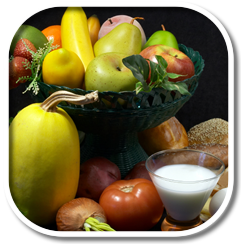Mrs Browning is not eating enough good sources of soluble and insoluble fibre in her diet. As fibre is indigestible, it adds bulk to the faeces making it more easily pushed along the digestive tract. Soluble fibre helps to soften the faeces. Good sources of soluble fibre include legumes, fruits and vegetables. Insoluble fibre adds bulk to the faeces helping it to move more quickly through the bowel. Good sources of insoluble fibre are in wheat bran, wholegrain breads and cereals.
Mrs Browning eats predominantly white bread, meat, potatoes and boiled vegetables. In recent years, her intake of biscuits and cake has increased, while her intake of fresh fruit has decreased. Porridge is a good source of fibre, so it is recommended that this remain in her diet. Muesli and other wholegrain breads and cereals, along with fruit and natural yoghurt, can also be added to Mrs Browning’s breakfast foods.
Legumes, such as baked beans, lentils, kidney beans, split peas and chick peas would also be healthy additions to her diet. She should add these to the soups and casseroles that she already makes. Mrs Browning might also steam or lightly stir-fry her vegetables, rather than boil them, as this retains more of the natural fibre and nutrients present in these foods.
Mrs Browning’s water intake, at 2-4 glasses per day, is also insufficient. She is advised to drink at least 8 glasses per day, particularly with the increase in her dietary fibre intake. The fibre in faeces will only plump up with water. Constipation may reoccur from a high fibre diet if insufficient water is consumed.
